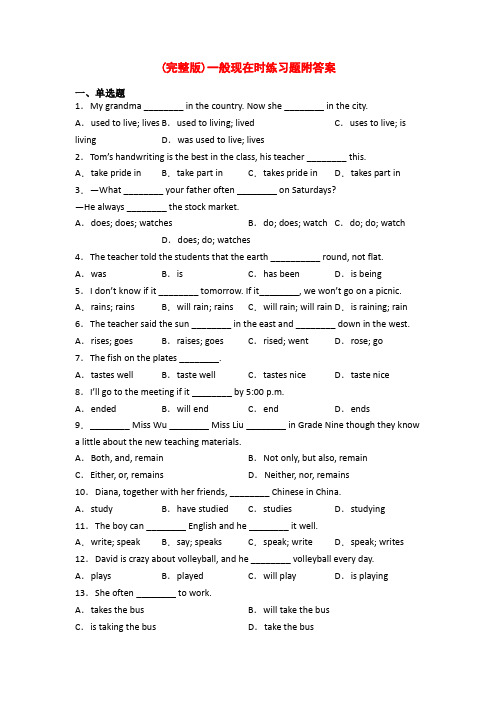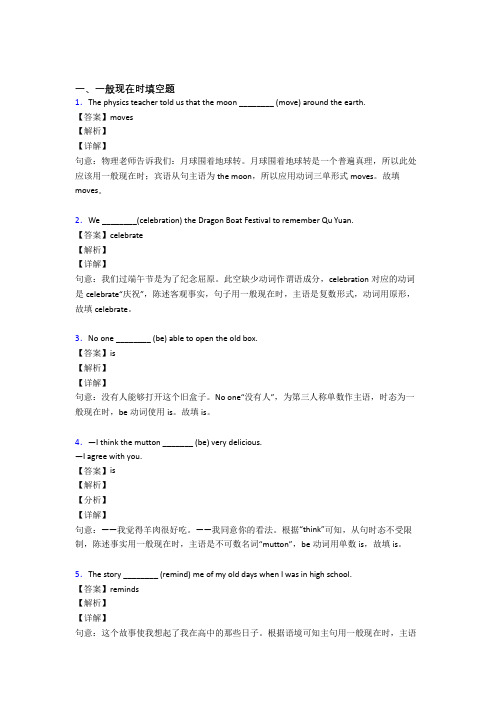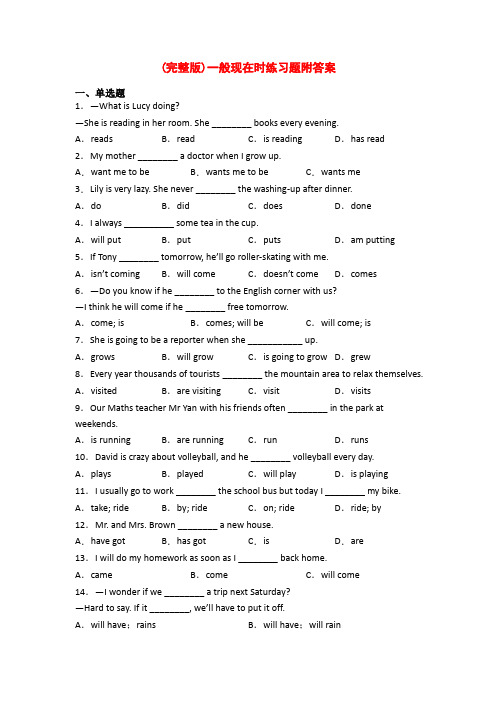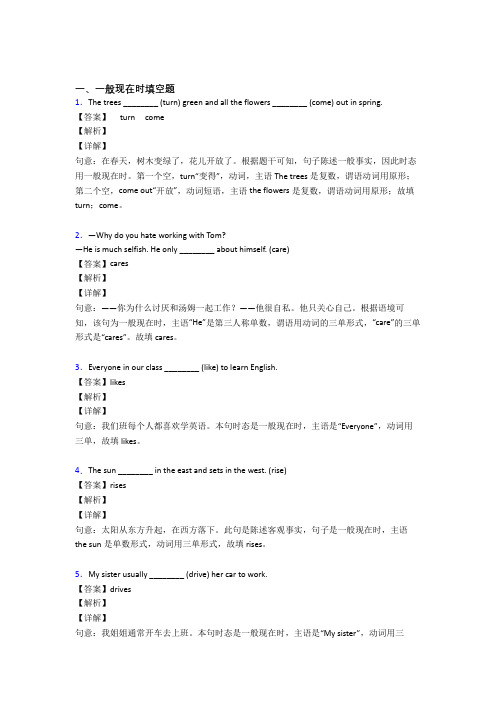一般现在时专项练习题及答案
(完整版)一般现在时练习题附答案

(完整版)一般现在时练习题附答案一、单选题1.My grandma ________ in the country. Now she ________ in the city.A.used to live; lives B.used to living; lived C.uses to live; is living D.was used to live; lives2.Tom’s handwriting is the best in the class, his teacher ________ this.A.take pride in B.take part in C.takes pride in D.takes part in 3.—What ________ your father often ________ on Saturdays?—He always ________ the stock market.A.does; does; watches B.do; does; watch C.do; do; watchD.does; do; watches4.The teacher told the students that the earth __________ round, not flat. A.was B.is C.has been D.is being5.I don’t know if it ________ tomorrow. If it________, we won’t go on a picnic. A.rains; rains B.will rain; rains C.will rain; will rain D.is raining; rain 6.The teacher said the sun ________ in the east and ________ down in the west. A.rises; goes B.raises; goes C.rised; went D.rose; go 7.The fish on the plates ________.A.tastes well B.taste well C.tastes nice D.taste nice 8.I’ll go to the meeting if it ________ by 5:00 p.m.A.ended B.will end C.end D.ends9.________ Miss Wu ________ Miss Liu ________ in Grade Nine though they know a little about the new teaching materials.A.Both, and, remain B.Not only, but also, remain C.Either, or, remains D.Neither, nor, remains10.Diana, together with her friends, ________ Chinese in China.A.study B.have studied C.studies D.studying 11.The boy can ________ English and he ________ it well.A.write; speak B.say; speaks C.speak; write D.speak; writes 12.David is crazy about volleyball, and he ________ volleyball every day. A.plays B.played C.will play D.is playing 13.She often ________ to work.A.takes the bus B.will take the busC.is taking the bus D.take the bus14.—Can Amy’s little sister count the numbers?—Yes, but she often ________ a long time ________ to one hundred.A.take, to count B.takes, count C.takes, to count15.If she ________ home on time, her mother will be worried.A.gets B.will get C.doesn’t get 16.—My sister is not going to eat many hamburgers.—If she ________, she will lose weight.A.does B.doesn’t C.will D.won’t 17.—Listen! Mr. Lee _______ the guitar now.—Yes, he always _______ it after lunch.A.is playing; is playing B.is playing; plays C.plays; is playing 18.Firemen ________ water ________ put out a fire.A.use;to B.use;/ C.uses;to D.used; / 19.—Don’t worry! There _________ enough space in your bag.—Good, I can put more things inside.A.was B.are C.were D.is20.We’ll climb the hill if it ________ the day after tomorrow.A.doesn’t rain B.is n’t rain C.won’t rain D.can’t rain二、用单词的正确形式填空21.I don’t need a soccer ball, but my brother Alan ________(do) .22.She ________ (have) a birthday party every year.23.I’m sorry that I ________ (agree) with you, because your idea is too old. 24.—I think the mutton _______ (be) very delicious.—I agree with you.25.It usually ________ (take) my father 20 minutes to get to his office every morning.26.Kate often ________ (have) a problem with her elder sister.27.He usually sleeps and ________ (relax) 18 hours a day.28.Linda said the moon ____ (travel) around the earth.29.Usually children ______ (not like) vegetables.30.When you ________ the way your parents deal with the problem, you can offer yours. (like)31.No news ________ (be) good news.32.I like rice for lunch, but my brother _________ hamburgers. (like)33.He often ______ (walk) his pet with his parents after dinner.34.Jenny will help me if she _______ (know) about it.35.Too much work and too little rest often l_____ to illness.36.The blue sweater ________ (look) very nice.37.Our parents __________(provide) us with food and clothes.38.Kate often ________ (watch) TV on Sunday.39.—Let’s go for a walk.— ________(sound) great.40.--Where is Tom?--I think he is at home. He often _________ (watch) TV in the evening.三、完成句子41.他们为我做过的每一件好事而自豪。
(完整版)一般现在时练习题及答案解析

一、一般现在时填空题1.Miss Green _________ (teach) us English every day.【答案】teaches【解析】【详解】句意:格林小姐每天教我们英语。
teach教,动词;由句中的every day可知句子时态用一般现在时,主语Miss Green是第三人称单数形式,所以谓语动词teach也要用第三人称单数形式teaches。
故填teaches。
2.Sam often ________ (fly) kites with his friends on windy days.【答案】flies【解析】【详解】句意:萨姆经常在刮风的日子和他的朋友放风筝。
根据“often”可知,该句为一般现在时,主语“Sam”是第三人称单数,谓语用动词的三单形式,“fly”的三单形式是“flies”。
故填flies。
3.I think the boy ________ (look) like his father.【答案】looks【解析】【详解】句意:我觉得这个男孩看起来像他的父亲。
根据语境可知,该句为一般现在时,主语“the boy”是第三人称单数,谓语用动词的第三人称单数形式,“look”的第三人称单数形式是“looks”。
故填looks。
4.Linda __________ (exercise) every morning, so she is very healthy.【答案】exercises【解析】【详解】句意:琳达每天早上锻炼,所以她很健康。
根据时间状语“every morning”可知,句子是一般现在时,主语是第三人称单数形式,故动词应用单三式exercises。
故填exercises。
5.His brother _____________ (work) at a hospital.【答案】works【解析】【详解】句意:他哥哥在一家医院工作。
根据时态是一般现在时,主语“His brother”是第三人称单数,所以用动词work“工作”的第三人称单数works,故填works。
(完整版)一般现在时练习题及答案

(完整版)一般现在时练习题及答案一、单选题1.— We must stay at home to do our homework if it ________ tomorrow.— OK, I agree.A.rain B.is rainy C.will rain D.is raining 2.—Where is our teacher? I wonder ________.—Sorry, I’ve no idea. But when she ________, I’ll call you.A.when will she come back; comes B.if she will come back later; will come C.when she will come back; comes3.I don’t know if he ________ to the English corner, but I will ask him about that when he ________ to the class.A.goes; will come B.will go; will come C.goes; comes D.will go; comes 4.He ________ very busy this week. He ________ free next week.A.will be; is B.is; is C.will be; will be D.is; will be 5.There ________ some paper and pen on the desk.A.is B.are C.have D.has6.I don’t know if it ________tomorrow. If it________, we won’t go on a picnic. A.rains; rains B.will rain; rains C.will rain; will rain D.is raining; rain 7.—What’s on the desk?—There ________ some books.A.is B.are C.be D.will be8.—I want to know if Maria ________ us.—If she ________ her homework, she will join us.A.joins; finishes B.will join; finishes C.joins; will finish D.will join; will finish9.Every summer the Greens __________ fishing in their hometown.A.go B.have gone C.went D.goes10.We ________ a science lesson on Wednesday.A.doesn’t have B.don’t have C.isn’t having D.aren’t having 11.I usually go to work ________ the school bus but today I ________ my bike. A.take; ride B.by; ride C.on; ride D.ride; by 12.—Mike usually ________ to the mathematics Olympia training lesson after school. But he ________ cards with his friends at the moment.—Well, it’s OK. He has just finished his final exams. “All work and no play makes Jacka dull boy.”A.goes; plays B.goes; is playing C.went; played D.will go; will play 13.—It’s going to snow tomorrow. I won’t get up so early on such a cold day!—If you ________ up early tomorrow, you will miss the early bus.A.won’t get B.didn’t get C.don’t get D.doesn’t get 14.—Listen! Some students ________ in the classroom.—Yes, they ________ there every Friday afternoon.A.sing; sing B.sing; are singingC.are singing; sing D.are singing; are singing15.I ________ every day because it’s good for my health.A.have breakfastB.has breakfastC.don’t have breakfastD.doesn’t have breakfast16.________ your brother ________ his homework every day?A.Does, do B.Do, does C.Do, do D.Does, does 17.They ________ the answer now, so they ________ about looking it up in the dictionary.A.aren’t knowing; are thinking B.don’t know; are thinkingC.don’t know; thi nks D.aren’t knowing; think18.—How do you like that dress?—I like it very much. It ________ soft and nice.A.feels B.is felt C.is feeling D.felt 19.Yesterday the teacher told us the earth ________ the sun.A.goes around B.went around C.is going around D.would go around 20.My mother often ________ my little sister ________ of the house and plays with her in the garden.A.take...out B.takes...out C.takes...to D.take...to二、用单词的正确形式填空21.Linda said the moon ____ (travel) around the earth.22.My father often ________________ (watch) football matches on TV.23.The boy ________ (not like) the show Where Are We Going, Dad?24.I’m sorry that I ________ (agree) with you, because your idea is too old.25.If it ________ (not rain) this weekend, we will go bike riding.26.The population of the city _______(be)about 500,000.27.It often ________(snow)here in winter. Look! It is ________(snow)again. 28.She knows playing sports _________ (be) good for her health.29.铃响了。
(完整版)一般现在时练习题含答案

一、一般现在时填空题1.The physics teacher told us that the moon ________ (move) around the earth.【答案】moves【解析】【详解】句意:物理老师告诉我们:月球围着地球转。
月球围着地球转是一个普遍真理,所以此处应该用一般现在时;宾语从句主语为the moon,所以应用动词三单形式moves。
故填moves。
2.We ________(celebration) the Dragon Boat Festival to remember Qu Yuan.【答案】celebrate【解析】【详解】句意:我们过端午节是为了纪念屈原。
此空缺少动词作谓语成分,celebration对应的动词是celebrate“庆祝”,陈述客观事实,句子用一般现在时,主语是复数形式,动词用原形,故填celebrate。
3.No one ________ (be) able to open the old box.【答案】is【解析】【详解】句意:没有人能够打开这个旧盒子。
No one“没有人”,为第三人称单数作主语,时态为一般现在时,be动词使用is。
故填is。
4.—I think the mutton _______ (be) very delicious.—I agree with you.【答案】is【解析】【分析】【详解】句意:——我觉得羊肉很好吃。
——我同意你的看法。
根据“think”可知,从句时态不受限制,陈述事实用一般现在时,主语是不可数名词“mutton”,be动词用单数is,故填is。
5.The story ________ (remind) me of my old days when I was in high school.【答案】reminds【解析】【详解】句意:这个故事使我想起了我在高中的那些日子。
根据语境可知主句用一般现在时,主语是单数名词,所以谓语动词用第三人称单数形式,故填reminds。
(完整版)一般现在时练习题附答案

(完整版)一般现在时练习题附答案一、单选题1.—What is Lucy doing?—She is reading in her room. She ________ books every evening.A.reads B.read C.is reading D.has read2.My mother ________ a doctor when I grow up.A.want me to be B.wants me to be C.wants me3.Lily is very lazy. She never ________ the washing-up after dinner.A.do B.did C.does D.done4.I always __________ some tea in the cup.A.will put B.put C.puts D.am putting5.If Tony ________ tomorrow, he’ll go roller-skating with me.A.isn’t coming B.will come C.doesn’t come D.comes6.—Do you know if he ________ to the English corner with us?—I think he will come if he ________ free tomorrow.A.come; is B.comes; will be C.will come; is7.She is going to be a reporter when she ___________ up.A.grows B.will grow C.is going to grow D.grew8.Every year thousands of tourists ________ the mountain area to relax themselves. A.visited B.are visiting C.visit D.visits9.Our Maths teacher Mr Yan with his friends often ________ in the park at weekends.A.is running B.are running C.run D.runs 10.David is crazy about volleyball, and he ________ volleyball every day.A.plays B.played C.will play D.is playing11.I usually go to work ________ the school bus but today I ________ my bike. A.take; ride B.by; ride C.on; ride D.ride; by 12.Mr. and Mrs. Brown ________ a new house.A.have got B.has got C.is D.are13.I will do my homework as soon as I ________ back home.A.came B.come C.will come14.—I wonder if we ________ a trip next Saturday?—Hard to say. If it ________, we’ll have to put it o ff.A.will have;rains B.will have;will rainC.have;rains D.have;will rain15.Uncle John has a big farm and he ________ the animals every morning. A.feed B.feeding C.feeds D.fed 16.Look, there ________ a lot of rubbish left on the ground.A.is B.are C.was D.were17.We usually have six lessons a day, and each of them ________ 40 minutes. A.lasts B.have C.need D.has18.My grandmother ________ glasses when she reads newspapers. A.doesn’ t need B.needn’ t C.don’ t need to D.needn’ t to 19.Mum, what are you cooking? It ________ so delicious.A.taste B.sound C.feels D.smells 20.The library _________ very early and it _________ after 10:00 p.m. A.opens; closes B.is open; is closed C.opens; is closed D.is open; closes 二、用单词的正确形式填空21.The launch of the Shenzhou-13 manned spacecraft is a complete success. It_________ (make) all Chinese proud.22.Jim with his friends ________ (take) the subway to school every day. 23.She ________ (speak) English very well.24.My mom is 1.67 meters tall and ________ (weigh) 65 kilos.25.There ______ (be) some milk and apples on the desk.26.He _________ (plan) to go for a picnic, doesn’t he?27.We won’t have our sports meeting if it ________ (rain) tomorrow. 28.When you ________ the way your parents deal with the problem, you can offer yours. (like)29.________________ (be) there a post office near here?30.With a wave of her magic wand, the witch changes the frog into a handsome prince and then ________ (appearance) in a puff of smoke.31.Mr. Huang ________________ (teach) us Chinese.32.______ (does) you buy things on the Internet?33.Simon ____ (not do) morning exercises at weekends.34.She often ______ (hear) from her friends.35.Too much work and too little rest often l_____ to illness.36.Please write to me as soon as you_____(reach)Shanghai.37.The panda ________ (not catch) animals for food.38.It ________ (look) very nice.39.Jim is good at all his lessons, but he never ________(show) off. He is a modest person.40.My father always _________ (watch) TV in the evening but my mothe r doesn’t.三、完成句子41.我经常在周末和朋友闲逛。
(完整版)一般现在时练习题含答案

一、一般现在时填空题1.Wednesday_________(come) after Tuesday.【答案】comes【解析】【详解】句意:星期三是在星期二之后。
本题说的是客观真理,因此用一般现在时。
Wednesday为单数,因此谓语用三单形式。
故答案为comes。
2.—Why do you hate working with Tom?—He is much selfish. He only ________ about himself. (care)【答案】cares【解析】【详解】句意:——你为什么讨厌和汤姆一起工作?——他很自私。
他只关心自己。
根据语境可知,该句为一般现在时,主语“He”是第三人称单数,谓语用动词的三单形式,“care”的三单形式是“cares”。
故填cares。
3.He is so kind that he _________(regard)the homeless child as his son.【答案】regards【解析】【详解】句意:他很善良,把那个无家可归的孩子当作自己的儿子。
根据句意可知,空处所在的句子是一般现在时,主语是第三人称单数形式,故动词应用单三式regards。
故填regards。
4.— Sometimes I ________ (eat) lunch at school. What about you?— Me too.【答案】eat【解析】【详解】句意:——有时我在学校吃午餐。
你呢?——我也是。
根据“sometimes”可知,句子是一般现在时,主语I是第一人称,动词用原形,故填eat。
5.Happiness ________ (shine) in the doctor’s eyes every tim e she sees a patient get well.【答案】shines【解析】【详解】句意:每当医生看到病人康复时,她的眼睛里就会闪烁着幸福的光芒。
(完整版)一般现在时练习题附答案

(完整版)一般现在时练习题附答案一、单选题1.—Please describe your new teacher to me, I want to know him.—OK. He ________ of medium height and always ________ a pair of glasses. A.is, with B.has, wears C.is, wears D.has, is2.Our Maths teacher Mr Yan with his friends often ________ in the park at weekends.A.is running B.are running C.run D.runs3.The people in my city, ________ my father ________ running in the park in the morning.A.like; likes B.likes; like C.likes; likes D.like; like 4.Physics __________ much harder than English, I think.A.are B.is C.was D.were 5.Every summer the Greens __________ fishing in their hometown.A.go B.have gone C.went D.goes 6.—Can I help you?—I bought this watch here yesterday, but it ________ work.A.won’t B.didn’t C.doesn’t D.wouldn’t 7.We ________ our classroom every day.A.clean B.cleaned C.is cleaning D.has cleaned 8.He can’t visit his aunt this week. He ________ go to the doctor.A.have to B.has got C.has got to D.need to 9.The rich woman always ________her success. Nobody is willing to make friends with her.A.shows off B.shows up C.showing up D.showing off 10.He _________ at 6:00 in the afternoon.A.get home B.gets to home C.gets home D.get to home 11.Tony ________ running. He ________ his brother.A.like; is like B.likes; is like C.is like; likes D.likes; look like 12.If she ________ to Beijing, I’ll show her around the city.A.comes B.came C.was coming D.has come 13.If you ________ this fast train, you will arrive in Shanghai in five hours. A.take B.will take C.took D.have taken 14.—I’d like to order a cappuccino with extra cinnamon and a piece of cheese cake.—I’m sorry but I ________quite ________you. What ________you order just now? A.don’t…catch; did B.didn’t...catch; was C.wasn’t...catch; did D.didn’t...catch;is15.— ________ you ________ any better today, young lady?— Yes, thank you, Doctor Mason. It ________ as much as it ________ yesterday. A.Are...feeling; doesn’t hurt; did B.Are…feeling; hurts; hurt C.Do...feel; wasn’t hurt; hurt D.Do...feel; hurts; did16.When I get up every morning, my father ________ to work.A.has gone B.had gone C.went D.goes17.Look at the cloud in the sky and it ________ to rain soon.A.seems B.quick C.looks D.likely 18.Doing eye exercises ________ one of the useful ways to protect our eyes.A.is B.are C.were19.Either his brothers or he ________ the dishes after dinner.A.do B.does C.make D.makes20.Our English teacher, Mr. Lee, often ________ basketball with his students in PE classes.A.plays B.to play C.play二、用单词的正确形式填空21.David is a good student. He always ________ (finish) his homework quickly. 22.How old ________ (be) your parents, Li Lei?23.—What ________ (do) John ________ (do) on Saturday evening?—He usually watches TV with his family.24.What time ________ your father ________ (eat) lunch?25.If it ________ (not rain) this weekend, we will go bike riding.26.They ________ (agree) with each other because they have different ideas. 27.Jim ________ (have) to get up early every morning.28.Everyone in his school ______ (know) him.29.Everyone in my class ________ (like) our English teacher. She is kind and patient. 30.Usually children ______ (not like) vegetables.31.This pair of trousers ________ (look) nice.32.Please show your health code (健康码) before you ________ this building. (entrance)33.Millie’s aunt ______ Chinese in a Hope School in Yunnan. She’s very kind. (teach) 34.The launch of the Shenzhou-13 manned spacecraft is a complete success. It_________ (make) all Chinese proud.35.What does Steve __________ (look) like?36.It ________ (look) very nice.37.Marie _______ (like) the Beijing Opera very much.38.After school she plays games and ______ (do) her homework.39.This pair of gloves ________ (be) Linda.40.The old man _____ (live) in a small village.三、完成句子41.我们在星期一和星期五有体育课。
(完整版)一般现在时练习题及答案

一、一般现在时填空题1.The trees ________ (turn) green and all the flowers ________ (come) out in spring.【答案】 turn come【解析】【详解】句意:在春天,树木变绿了,花儿开放了。
根据题干可知,句子陈述一般事实,因此时态用一般现在时。
第一个空,turn“变得”,动词,主语The trees是复数,谓语动词用原形;第二个空,come out“开放”,动词短语,主语the flowers是复数,谓语动词用原形;故填turn;come。
2.—Why do you hate working with Tom?—He is much selfish. He only ________ about himself. (care)【答案】cares【解析】【详解】句意:——你为什么讨厌和汤姆一起工作?——他很自私。
他只关心自己。
根据语境可知,该句为一般现在时,主语“He”是第三人称单数,谓语用动词的三单形式,“care”的三单形式是“cares”。
故填cares。
3.Everyone in our class ________ (like) to learn English.【答案】likes【解析】【详解】句意:我们班每个人都喜欢学英语。
本句时态是一般现在时,主语是“Everyone”,动词用三单,故填likes。
4.The sun ________ in the east and sets in the west. (rise)【答案】rises【解析】【详解】句意:太阳从东方升起,在西方落下。
此句是陈述客观事实,句子是一般现在时,主语the sun是单数形式,动词用三单形式,故填rises。
5.My sister usually ________ (drive) her car to work.【答案】drives【解析】【详解】句意:我姐姐通常开车去上班。
- 1、下载文档前请自行甄别文档内容的完整性,平台不提供额外的编辑、内容补充、找答案等附加服务。
- 2、"仅部分预览"的文档,不可在线预览部分如存在完整性等问题,可反馈申请退款(可完整预览的文档不适用该条件!)。
- 3、如文档侵犯您的权益,请联系客服反馈,我们会尽快为您处理(人工客服工作时间:9:00-18:30)。
一般现在时专项讲解及练习题及答案一、概念:用法可概括为:①经常性或习惯性动作,常与表示频度的时间状语连用。
如:often,always,sometimes, every …, on Sunday 等;I go to school on weekdays.②现在时刻的状态、能力、性格、个性。
如:I don't want so much. Ann Wang writes good English but does not speak well.③普遍真理、客观事实等。
如:The earth moves around the sun. Shanghai lies in the east of China.注意:此用法如果出现在宾语从句中,即使主句是过去时,从句谓语也要用一般现在时。
例:Columbus proved that the earth is round.④表示格言或警句中。
如:Pride goes before a fall. 骄者必败。
二、构成:一般现在时的构成主要有两种形式:(1)be型:句子的谓语动词只有be(am,is或are):;a.肯定句中,只出现be,如:I am a student.我是一名学生。
b.否定句中,要在be后面加not,如:She isn't a teacher.她不是教师。
c.一般疑问句,要将be放在句子开头(注意句首字母大写),句尾用问号,答语用Yes,主语+be.或No,主语+be+not.如:—Are you ready—你准备好了吗—Yes,I am.—是的,我准备好了。
(—No,I'm not.—不,我没准备好。
)1). She is a beautiful girl with long black hair. (改为否定句和一般疑问句并作肯定否定回答)"2). They are Chinese students. (同上)(2)实义动词型:句中的谓语动词为实义动词(也叫行为动词):a.肯定句中,只出现实义动词,如:I get up in the morning.我早晨起床。
b.否定句中,要在实义动词前面加do(does)+not,do(does)作助动词,本身无意义,常与not缩写成don't(doesn't),如:I don't like vegetables.我不喜欢蔬菜。
,c.一般疑问句,要在句子开头加助动词Do(does),句尾用问号,简略答语用Yes,主语+do(does).或No,主语+do(does)+not.如:—Do you like oranges—你喜欢桔子吗—Yes,I do.—是的,我喜欢。
(—No,I don't.—不,我不喜欢。
)1). Tom goes to school by bike every day. (改为否定句和一般疑问句并作肯定否定回答)2). We like playing basketball on the playground after school every day. (同上)。
是:此处要注意看相约高校,上面的内容多。
(1) 在动词后加-s,-es:如:read - reads,write - writes,say - says(2) 以s,x,ch,sh 结尾的词加-es:teach - teaches,wash - washes,guess - guesses(3) 以辅音字母+y结尾的词变y为i再加-es:try - tries,carry - carries(4) 特殊变化的词:A. be (是) - am, is, areI +am …; she/he/it/名词单数+is ; we/you/they/名词复数+are如: Lucy is at home now. 露茜现在在家。
B. have (有) - have, has;I/we/ you/they/名词复数+have ; she/he/it /名词单数+has如: We have six classes every day. 我们每天上六节课。
She has math from Monday to Friday.(5) 助动词do/does,使用了助动词就木有人称和数的变化,都用动词原形表示He doesn’t like tennis because he thinks it’s boring.(6) 情态动词can, may, must, need, ought toWe can see some pictures on the wall. 我们能看到墙上的画(一)单选:1. Where Lucy come fromA. doB. doesC. isD. are~2. Most of the students China.A. comes fromB. is fromC. are fromD. come of3. We speak English .A. every daysB. everydayC. very dayD. every day4. My math teacher a big pair of glasses.A. wearsB. put onC. wearD. puts on5. What your father and motherA. does, doB. do, doC. are, doD. do, does(二)用动词适当形式填空:1. His radio is broken. It (sound)terrible.~2. Did somebody drop water on the rug It (look)wet.3. Every year my parents (give)me a present for my birthday.4. The club (send)her a letter every month.5. your dad (wash)his car once a week Yes, he does.6. Lin Tao is a good student. He (study)very hard.7. They (work)at the bank.(三)句型转换:1. My living room has three windows. (改为否定句)2. Jim and Jack like swimming on Sundays.(就划线部分提问)\3. We are in the same class. (改为一般疑问句)4. He comes from England.(就划线部分提问)一、用所给动词的适当形式填空。
1. I often (help)my mother with housework.2. Uncle Wang (introduce)his daughter to us.3. He (have)music class in Mondays.,4. How (do)he (get)there5. (do)you (agree)with me6. All of us (study)hard.7. He always (forget)to close the window.8. Grandma often (cook)dinner for our family.二、填空。
Mrs. Black’s DayMrs. Black often (get)up at 7:00 on Sunday morning. She (have)breakfast at 8:30. She (have) a little dog. She (like)to go to the park with her dog. At 10:50, Mrs. Black sometimes (wash)her clothes. At 3:00 . she usually (go)shopping. She often (make)supper at 6:00 . She doesn’t (watch)TV at night. She (go)to bed at about 10:.三、联词组句。
1. tomorrow, give it back , please\2. is, it, today, what day3. Uncle John, I, speak to, May, please4. some money, borrow, I, from you, May5. at this time of day, the shop, I think, is, closedⅠ.用括号内动词的适当形式填空。
'1. He often (have) dinner at home.2. Daniel and Tommy (be) members of the Reading Club.3. She and I (take)a walk together every evening.4. There (be) some water in the bottle.5. We (not watch) TV on weekdays.6. Nick (not do) his homework on Sundays.7. they (like) the World Cup8. What they usually (do) on holidays9. your parents (read) newspapers every day10. The girl (teach) us English on Sundays.*Ⅱ.按照要求改写句子。
watches TV every evening.(改为否定句)Daniel TV every evening.2. I do my homework every day .(改为一般疑问句并作否定回答)——you homework every day——No, I .3. She likes milk.(改为一般疑问句并作肯定回答)——she milk—— Yes., she does .4. Simon is from Beijing.(同义句改写)#Simon Beijing.5. Millie is clever at Maths.(同义句改写)Millie Maths .Ⅲ.改错。
your brother speak EnglishA B C ( )he looks like his fatherA B C ( )likes play games after class.A B C ( )"Wu teachs us English.A B C ( )5She doesn't her homework on Sundays.A B C ( )Ⅳ.将下列句子译成英文。
